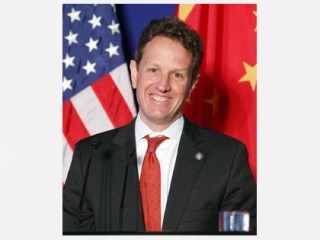
Timothy Geithner biography
Date of birth : 1961-08-18
Date of death : -
Birthplace : New York City, New York, U.S.
Nationality : American
Category : Politics
Last modified : 2010-06-25
Credited as : Economist and federal official, Secretary of the Treasury, Obama administration
0 votes so far
Timothy Geithner in 2009 became Secretary of the Treasury in the Cabinet of U.S. President Barack Obama. Geithner had extensive experience in international economics, including serving as an assistant financial attaché at the American embassy in Japan. Before being nominated for Treasury secretary, he served as the chief executive officer (CEO) of the Federal Reserve Bank of New York.
Geithner was born on August 18, 1961, in New York City. He earned his B.A. degree in government and Asian studies from Dartmouth College in 1983, then entered the Johns Hopkins School of Advanced International Studies. There, Geithner earned a master's degree in international economics and East Asian studies in 1985.
Worked in Treasure Department
After completing his education, Geithner joined Kissinger Associates Inc., where he worked from 1985 to 1988. Beginning in 1988, he worked for the federal government, spending seven years as the assistant financial attaché at the U.S. embassy in Japan. After short stints as the deputy assistant secretary of international monetary and financial policy at the U.S. Department of the Treasury and the senior deputy assistant secretary of the Treasury for international affairs, Geithner became the assistant secretary of international affairs. From 1998 to 2001, Geithner served as the undersecretary of the Treasury for International Affairs. During his time with the government, he was the representative of the United States at international financial meetings with key countries and helped negotiate financial services trade agreements.
In 2001 Geithner spent six months as a senior fellow in international economics at the Council on Foreign Relations before joining the International Monetary Fund as the director of the Policy Development and Review Department. In this position, he helped design and implement the policies of the organization. In 2003 Geithner took on a role of even greater importance when he was named the CEO of the Federal Reserve Bank of New York, where he played a key role in developing the United States' interest rate policies. Geithner also helped manage crises in both the American and international financial systems. When the American economy hit the skids in 2008, he played a significant role in crafting the Fed's response by having cash infused into troubled investment and financial companies.
Nominated Secretary of the Treasury
While serving as the head of the Federal Reserve, Geithner was nominated as the Secretary of the Treasury by incoming President Barack Obama in November of 2008. In this post, Geithner was to be the leading economic official in the Obama administration, poised to face the most challenging American economic crisis in decades. Because his work with the Federal Reserve was so highly regarded by Wall Street, news of his appointment caused a sagging stock market to surge nearly 500 points on that day. Kevin Hassett of the American Enterprise Institute told Jim Puzzanghera and Peter G. Gosselin of the Los Angles Times, "It's a terrific choice. He's been in the middle of this [economic crisis], he has been at Treasury and he's a very bright guy, highly respected by people in both parties."
The Senate Finance Committee, while considering Geithner's appointment, issued a statement that he failed to pay self-employment taxes for money he received while he worked for the International Monetary Fund from 2001 to 2004. Geithner, who said the discrepancy as unintentional, settled his $42,702 bill for overdue taxes and interest. The Senate by a 60-34 vote confirmed Geithner, who was sworn in January 26. The tax problems "could have sunk his nomination in less trying times," the Associated Press (AP) wrote.
In March of 2009, Geithner said he should have known sooner about a loophole to federal stimulus legislation that permitted executives of troubled insurer American International Group to receive large bonuses. In letter to congressional leaders, he said AIG must return $165 million to the Treasury Department. Geithner later that year said that under so-called "stress tests," ten of the top U.S. bank holding companies, in a worst-case economic scenario, must raise an additional $75 billion to cover possible losses in 2009 and 2010. He also hired Lazard investment banker James Millstein as a top aide.
In August of 2009, reports circulated that Geithner unleashed a profanity-laced tirade at top financial regulators over a meeting to discuss problems securing passage of Obama's proposal to overhaul the financial system. The meeting included Federal Reserve Chairman Ben Bernanke, Securities and Exchange Commission Chairwoman Mary Schapiro and Federal Deposit Insurance Corporation Chairwoman Sheila Bair, all of whom worried about how changes would affect their jurisdictions. "[The July 31] meeting was described as unusual, not only because of Mr. Geithner's repeated use of obscenities, but because of the aggressive posture he took with officials from federal agencies generally considered independent of the White House. Mr. Geithner reminded attendees that the administration and Congress set policy, not the regulatory agencies," Daiman Paletta and Deborah Solomon wrote in the Wall Street Journal.
















